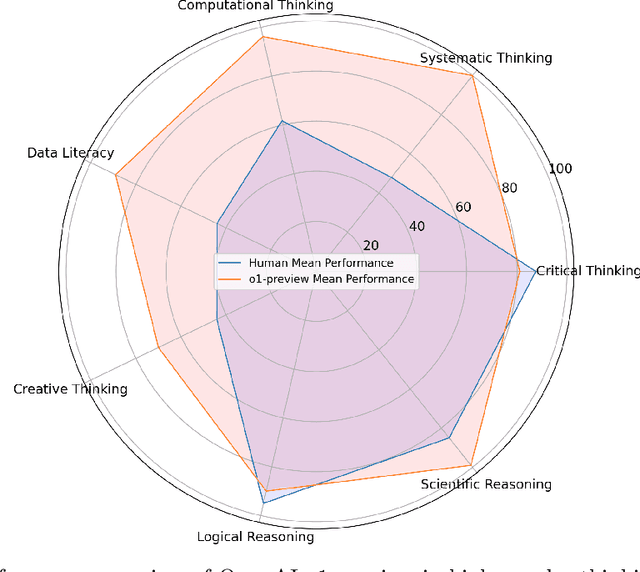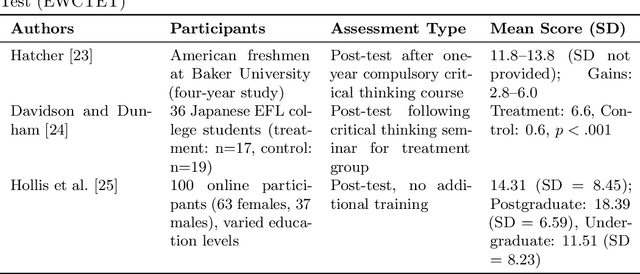Shuchen Guo
Artificial Intelligence Bias on English Language Learners in Automatic Scoring
May 15, 2025Abstract:This study investigated potential scoring biases and disparities toward English Language Learners (ELLs) when using automatic scoring systems for middle school students' written responses to science assessments. We specifically focus on examining how unbalanced training data with ELLs contributes to scoring bias and disparities. We fine-tuned BERT with four datasets: responses from (1) ELLs, (2) non-ELLs, (3) a mixed dataset reflecting the real-world proportion of ELLs and non-ELLs (unbalanced), and (4) a balanced mixed dataset with equal representation of both groups. The study analyzed 21 assessment items: 10 items with about 30,000 ELL responses, five items with about 1,000 ELL responses, and six items with about 200 ELL responses. Scoring accuracy (Acc) was calculated and compared to identify bias using Friedman tests. We measured the Mean Score Gaps (MSGs) between ELLs and non-ELLs and then calculated the differences in MSGs generated through both the human and AI models to identify the scoring disparities. We found that no AI bias and distorted disparities between ELLs and non-ELLs were found when the training dataset was large enough (ELL = 30,000 and ELL = 1,000), but concerns could exist if the sample size is limited (ELL = 200).
Can OpenAI o1 outperform humans in higher-order cognitive thinking?
Dec 07, 2024



Abstract:This study evaluates the performance of OpenAI's o1-preview model in higher-order cognitive domains, including critical thinking, systematic thinking, computational thinking, data literacy, creative thinking, logical reasoning, and scientific reasoning. Using established benchmarks, we compared the o1-preview models's performance to human participants from diverse educational levels. o1-preview achieved a mean score of 24.33 on the Ennis-Weir Critical Thinking Essay Test (EWCTET), surpassing undergraduate (13.8) and postgraduate (18.39) participants (z = 1.60 and 0.90, respectively). In systematic thinking, it scored 46.1, SD = 4.12 on the Lake Urmia Vignette, significantly outperforming the human mean (20.08, SD = 8.13, z = 3.20). For data literacy, o1-preview scored 8.60, SD = 0.70 on Merk et al.'s "Use Data" dimension, compared to the human post-test mean of 4.17, SD = 2.02 (z = 2.19). On creative thinking tasks, the model achieved originality scores of 2.98, SD = 0.73, higher than the human mean of 1.74 (z = 0.71). In logical reasoning (LogiQA), it outperformed humans with average 90%, SD = 10% accuracy versus 86%, SD = 6.5% (z = 0.62). For scientific reasoning, it achieved near-perfect performance (mean = 0.99, SD = 0.12) on the TOSLS,, exceeding the highest human scores of 0.85, SD = 0.13 (z = 1.78). While o1-preview excelled in structured tasks, it showed limitations in problem-solving and adaptive reasoning. These results demonstrate the potential of AI to complement education in structured assessments but highlight the need for ethical oversight and refinement for broader applications.
Using Generative AI and Multi-Agents to Provide Automatic Feedback
Nov 11, 2024

Abstract:This study investigates the use of generative AI and multi-agent systems to provide automatic feedback in educational contexts, particularly for student constructed responses in science assessments. The research addresses a key gap in the field by exploring how multi-agent systems, called AutoFeedback, can improve the quality of GenAI-generated feedback, overcoming known issues such as over-praise and over-inference that are common in single-agent large language models (LLMs). The study developed a multi-agent system consisting of two AI agents: one for generating feedback and another for validating and refining it. The system was tested on a dataset of 240 student responses, and its performance was compared to that of a single-agent LLM. Results showed that AutoFeedback significantly reduced the occurrence of over-praise and over-inference errors, providing more accurate and pedagogically sound feedback. The findings suggest that multi-agent systems can offer a more reliable solution for generating automated feedback in educational settings, highlighting their potential for scalable and personalized learning support. These results have important implications for educators and researchers seeking to leverage AI in formative assessments, offering a pathway to more effective feedback mechanisms that enhance student learning outcomes.
Multimodality of AI for Education: Towards Artificial General Intelligence
Dec 12, 2023

Abstract:This paper presents a comprehensive examination of how multimodal artificial intelligence (AI) approaches are paving the way towards the realization of Artificial General Intelligence (AGI) in educational contexts. It scrutinizes the evolution and integration of AI in educational systems, emphasizing the crucial role of multimodality, which encompasses auditory, visual, kinesthetic, and linguistic modes of learning. This research delves deeply into the key facets of AGI, including cognitive frameworks, advanced knowledge representation, adaptive learning mechanisms, strategic planning, sophisticated language processing, and the integration of diverse multimodal data sources. It critically assesses AGI's transformative potential in reshaping educational paradigms, focusing on enhancing teaching and learning effectiveness, filling gaps in existing methodologies, and addressing ethical considerations and responsible usage of AGI in educational settings. The paper also discusses the implications of multimodal AI's role in education, offering insights into future directions and challenges in AGI development. This exploration aims to provide a nuanced understanding of the intersection between AI, multimodality, and education, setting a foundation for future research and development in AGI.
 Add to Chrome
Add to Chrome Add to Firefox
Add to Firefox Add to Edge
Add to Edge